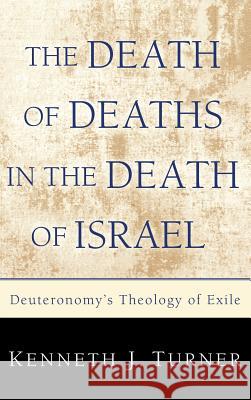The Death of Deaths in the Death of Israel » książka
The Death of Deaths in the Death of Israel
ISBN-13: 9781498254007 / Angielski / Twarda / 2010 / 292 str.
The Death of Deaths in the Death of Israel
ISBN-13: 9781498254007 / Angielski / Twarda / 2010 / 292 str.
(netto: 199,10 VAT: 5%)
Najniższa cena z 30 dni: 208,48
ok. 16-18 dni roboczych
Dostawa w 2026 r.
Darmowa dostawa!
Description: This book explores Deuteronomy's understanding of exile. While Deuteronomy speaks of a potential historical experience in the nation's future, ""exile"" is also a dynamic theological concept. In short, exile represents the death of Israel. In losing her land, Israel apparently also loses her identity, history, and covenant relationship with Yahweh. Restoration from exile, then, is a resurrection from death to life. Since exile is a recurring theme in Deuteronomy, the theology of the book must be considered in light of its vision of exile and restoration. The thesis of the following study consists of three major aspects: (1) the theological construct that exile constitutes the death of Israel; (2) the pervasiveness of the theme of exile in Deuteronomy; and (3) the significance of the theme of exile for understanding and developing the theology of the book. While the theological connection between exile and death is not new, this study attempts to ground this association in the vocabulary of the text. This, in turn, will open up a more nuanced reading of the entire book in which the persistent presence and influence of the theme of exile on Deuteronomy's overt message, underlying theology, and structure will be recognized. A major catalyst for this work is a network of debates among Evangelicals in New Testament theology, including covenant nomism and the New Perspective on Paul. For some, Jesus' preaching of the kingdom and the forgiveness of sins is tied up with the nation's expectations of the return from exile, which is fulfilled in his death and resurrection. Proponents of this position (e.g., N. T. Wright) often turn to Deuteronomy for support. In some ways, the present work implicitly enters this discussion by providing Old Testament theological background en route to evaluating implications being drawn. Endorsements: ""Turner wrestles gallantly with a subject that is long overdue: exile and restoration in Deuteronomy and the soteriological implications of the book's development of these themes. He argues persuasively for a view of the Torah that highlights grace--grace in salvation and grace in Israel's ultimate fulfillment of the call of God. This is biblical theology at a high level, introducing readers not only to a particular book, but to a theme that is at the core of biblical revelation and at the heart of the Gospel."" --Daniel I. Block Gunther H. Knoedler Professor of Old Testament Wheaton College About the Contributor(s): Kenneth Turner is Associate Professor of Bible at Bryan College in Dayton, Tennessee.
Description:This book explores Deuteronomys understanding of exile. While Deuteronomy speaks of a potential historical experience in the nations future, ""exile"" is also a dynamic theological concept. In short, exile represents the death of Israel. In losing her land, Israel apparently also loses her identity, history, and covenant relationship with Yahweh. Restoration from exile, then, is a resurrection from death to life. Since exile is a recurring theme in Deuteronomy, the theology of the book must be considered in light of its vision of exile and restoration. The thesis of the following study consists of three major aspects: (1) the theological construct that exile constitutes the death of Israel; (2) the pervasiveness of the theme of exile in Deuteronomy; and (3) the significance of the theme of exile for understanding and developing the theology of the book. While the theological connection between exile and death is not new, this study attempts to ground this association in the vocabulary of the text. This, in turn, will open up a more nuanced reading of the entire book in which the persistent presence and influence of the theme of exile on Deuteronomys overt message, underlying theology, and structure will be recognized.A major catalyst for this work is a network of debates among Evangelicals in New Testament theology, including covenant nomism and the New Perspective on Paul. For some, Jesus preaching of the kingdom and the forgiveness of sins is tied up with the nations expectations of the return from exile, which is fulfilled in his death and resurrection. Proponents of this position (e.g., N. T. Wright) often turn to Deuteronomy for support. In some ways, the present work implicitly enters this discussion by providing Old Testament theological background en route to evaluating implications being drawn.Endorsements:""Turner wrestles gallantly with a subject that is long overdue: exile and restoration in Deuteronomy and the soteriological implications of the books development of these themes. He argues persuasively for a view of the Torah that highlights grace--grace in salvation and grace in Israels ultimate fulfillment of the call of God. This is biblical theology at a high level, introducing readers not only to a particular book, but to a theme that is at the core of biblical revelation and at the heart of the Gospel.""--Daniel I. BlockGunther H. Knoedler Professor of Old TestamentWheaton CollegeAbout the Contributor(s):Kenneth Turner is Associate Professor of Bible at Bryan College in Dayton, Tennessee.











